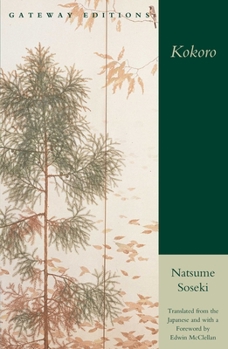Kokoro
Select Format
Select Condition 
Book Overview
"The novel sustains throughout its length something approaching poetry, and it is rich in understanding and insight. The translation, by Edwin McClellan, is extremely good." --Anthony West, The New Yorker Kokoro, which means "the heart of things," explores emotions familiar to everyone--love and hate, hope and despair, companionship and loneliness. Sensei, a man seen against the rich background of old Japan entering...
Format:Paperback
Language:English
ISBN:0895267152
ISBN13:9780895267153
Release Date:July 1996
Publisher:Gateway Editions
Length:248 Pages
Weight:0.55 lbs.
Dimensions:0.8" x 5.4" x 8.3"
Customer Reviews
3 ratings
evergreen, poetic and life in post Meiji Japan
Published by Thriftbooks.com User , 19 years ago
I became a fan of Soseki after I read "Botchan" and "I am a cat" - both were fascinating books. Then I found "kokoro" in a book shop in SF. I am glad i bought it. This is a different genre of book - more of introspection and constructive criticism of the post Meiji Japan. I took a long time to read the book, like I do to read Kawabata - the culture is vastly different and most of the ideas are not explicit - you have to think imagine. Actually another great Japanese author, Junichiro Tanizaki, said that the modern day writer is too kind to the reader - so you have to think and interpret while you read. The book is written in first person (it is quite autobiographical). It explores the feelings of a young college graduate - it examines his feelings. The narrator is obsessed with his friend, philosopher and guide whom he refers as "sensei" even though this person in return do not have the same feelings for the narrator in the beginning. Still he directs the narrator through some of the torturous path of life. The narrators father is in his death bed when he receives the last mail from his "sensei" - the contents of this letter covers later half of the book. In the letter his teacher narrates his own life. Two things to notice - the absence of religious overtones or under currents and the respect for death. As I have read Mishima, Akutagawa I have found that in Japanese culture death has a more profound meaning than just the end of life. More than often this end of life is preceded by the objective of going on to live and in its absence death seems to be the obvious choice even though ominous. Here also we find quite a few death but everybody, which includes the person who is dying and his or her close ones look for the objective of living. The status of women may provide a little sting to western readers but please realize that this is near end of Meiji era is Japan and not Las Vegas in 2004. Please do not try to read this book in your flight from Boston to LA or you will be bored to death better read it in the Christmas holidays
Japanese ambiguous heart.
Published by Thriftbooks.com User , 23 years ago
Most of us Japanese people read this novel called "Kokoro"(Kokoro means Heart.) when we are high school students in a japanese class. Our Japanese text books always include this Kokoro. So most of students read and study how our greatest writer was worried in those days. Add to it, this writer, Sohseki is one of the most greatest writer in Japan at the Meiji era. He turned from an English professor to a novelist. At the Meiji era, we japanese decided to accept European culture with changing our own unique life style. So the elite professor like Sohseki was very annoyed between European culture that suddenly come enter to our life and our traditional culture. Yes, most of Sohseki's works are "unfinished" as novel. Kokoro was't finished, either. We can call it this novel is very ambiguous, vague, obscure. Sohseki just presents us complicated, unfathomable, but delicate, deliberate, deep and serious themes in this novel. Presumably this Kokoro was unsuccessful work as novel, however, all sides of our life are not always completely "finished", are they? Sohseki's works are really our precious fortune.
An exquisite study of loneliness
Published by Thriftbooks.com User , 25 years ago
The subject matter of this charming Japanese novel by one of the dozen or so greatest writers of the 20th century, is the loneliness spanning two generations of Japanese men. A story within a story, it begins with an exposition of the profound influence one man, Sensei, has on a young friend (the narrator) and in particular, the devastating consequences that Sensei's cataclysmic decision has on the narrator's life. Later in the book we hear Sensei's own story in which he describes the devastating consequences had on his own life by a cataclysmic decision made by one of the people he valued most. The book is deceptively simple but floods with lyrical beauty. It is a book that lives on in your mind for a long time, and taps into the inevitable feeling that we all have from time to time that we are alone, swallowed by the "silence of the whirlpool". Awesome. Read it and never regret it.





